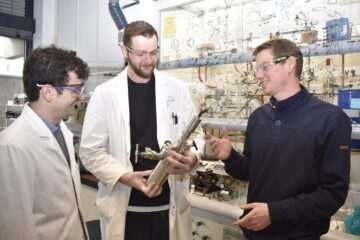Heating from carbon dioxide will increase five-fold over the next millennia

Scientists studied the impact that current carbon emissions have on the delicate balance between air and sea carbon exchange. They found that the ocean’s ability to store excessive amounts of carbon dioxide over thousands of years will affect the long-term heating of the planet.
The ocean acts as an enormous carbon sink which naturally absorbs any extra carbon dioxide added to the atmosphere. Its ability to store more carbon dioxide than both the atmosphere and land provides long-term storage for the carbon dioxide emitted by human activities.
Scientists at Liverpool, however, have found that if all conventional coal, oil and gas carbon reserves are exhausted, the excessive amounts of carbon dioxide in the atmosphere will begin to alter the ocean’s natural chemistry and hinder its ability to absorb and exchange the gas.
Professor Ric Williams, from the University’s School of Earth and Ocean Sciences, explains: “It is accepted that rising atmospheric carbon dioxide concentrations lead to an increase in heating around the globe. It was, however, unclear as to how the ocean’s ability to store carbon could affect the future overall heating of the earth.
“The excessive amount of carbon in the atmosphere will make the oceans more acidic and hamper the ability of the oceans to absorb further carbon from the atmosphere. The extra carbon dioxide remaining in the atmosphere will lead to an increase in the overall heating of our planet, making sea levels rise and exacerbating the melting of the Arctic ice caps.
“To prevent a situation like this from happening scientists are working to develop carbon-capture techniques, which aim to remove excess carbon from identifiable sites, such as the atmosphere around fossil fuel plants, and permanently store them away.”
The research, in collaboration with the University of East Anglia, The University of Bristol and Massachusetts Institute of Technology, is funded by the UK Natural Environment Research Council.
Media Contact
More Information:
http://www.liv.ac.ukAll latest news from the category: Ecology, The Environment and Conservation
This complex theme deals primarily with interactions between organisms and the environmental factors that impact them, but to a greater extent between individual inanimate environmental factors.
innovations-report offers informative reports and articles on topics such as climate protection, landscape conservation, ecological systems, wildlife and nature parks and ecosystem efficiency and balance.
Newest articles

Lower dose of mpox vaccine is safe
… and generates six-week antibody response equivalent to standard regimen. Study highlights need for defined markers of mpox immunity to inform public health use. A dose-sparing intradermal mpox vaccination regimen…

Efficient, sustainable and cost-effective hybrid energy storage system for modern power grids
EU project HyFlow: Over three years of research, the consortium of the EU project HyFlow has successfully developed a highly efficient, sustainable, and cost-effective hybrid energy storage system (HESS) that…

Safer alternative for an explosive reaction
The chemical industry has been using a reaction with explosive chemicals for over 100 years – now Mülheim scientists have discovered a safer alternative. The Ritter Group of the Max…





















